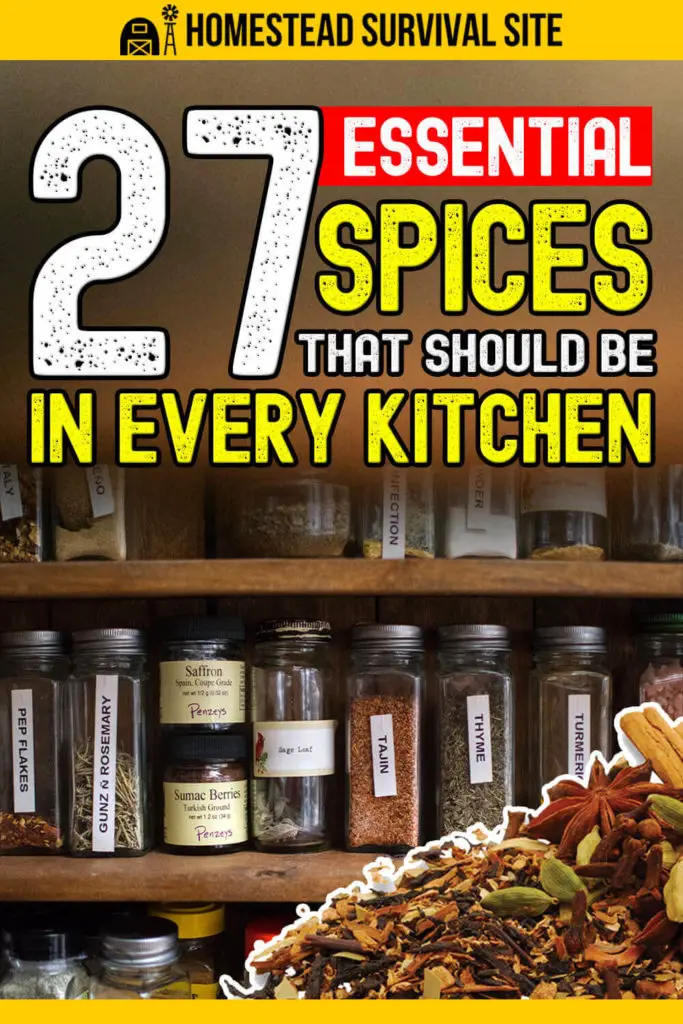Estimated reading time: 6 minutes
Whether you're stockpiling food or just organizing your first kitchen, be sure to include lots of spices on your list of necessities. By having the following essentials on hand, you'll already have all the spices you need for almost any meal. And in addition to being able to flavor your food, you'll also be able to heal many ailments.
First, you may wonder about the terms “spice” and “herb.” While most of us tend to use the terms interchangeably, there are some differences between them. Spices are the dried seeds, roots, bark, flower buds or undeveloped fruit of a plant, and they tend to be more potent than herbs. Herbs are generally the leaves of non-wooded plants.
For instance, cinnamon, saffron, mustard, ginger, and cloves are spices. Rosemary, oregano, parsley, and chives are herbs. In this article, we will use the term “spice” for both types of seasonings.
Although most spices do not “go bad,” they do lose their potency with time. Whole herbs and spices are best for long-term storage and for best flavor. Use a mortar and pestle to crush, grind and powder your whole spices.
Want to save this post for later? Click Here to Pin It On Pinterest!
Now, in alphabetical order, here are 27 essential spices for your home pantry.
1. Bay Leaves – Use these small dried leaves to add flavor and aroma to soups, stews, and marinades. You also can use bay leaves to ward off insects in your pantry.
2. Black Peppercorns – If you have always used pre-ground pepper, you owe it to yourself to discover the rich taste of freshly ground pepper. Whole peppercorns last indefinitely and can be used to flavor just about any dish.
3. Cayenne Pepper – Made from spicy red peppers, this spice is used in many Indian and Cajun recipes. It also doubles as an insect repellent when spread around window ledges or doorways and has many healing properties.
4. Celery Seed – Use this pungent spice in soups and stews when you do not have fresh celery on hand.
5. Chili Powder – As the dried, pulverized fruit of the chili pepper, chili powder adds rich flavor to beans. Its distinctive heat is an essential part of many Mexican and Southwestern recipes.
6. Cinnamon – With its warm, bittersweet flavor, cinnamon is great for cakes and cookies, and it adds flavor and an earthy quality to stews, curries, and chilies. Cinnamon also has many traditional medicinal uses.
7. Cloves – Use this strong spice sparingly to add flavor and richness to your baked goods – especially around holiday time.
8. Coriander – This spice is regularly used in Indian food, but it also makes a great in spice rubs for fish and chicken.
9. Cumin – Ground from a small seed, cumin is an essential part of many Indian and Middle Eastern dishes. Rich in iron and calcium, the aromatic spice also aids in digestion.
10. Curry Powder – This popular blend contains as many as 20 spices, including coriander, turmeric, and cumin. Count in it to fill your home with pleasant aromas.
11. Dill – You can use the leaves (herb) or the seeds (spice) of the dill plant to add flavor to recipes with tuna, egg, and potatoes.
12. Fennel Seeds – With its licorice-like flavor, fennel seeds are an important component of homemade sausage as well as Italian sauces.
13. Garlic Powder – Packed with antioxidants, garlic powder is great to have on hand when you are out of fresh garlic.
14. Ginger – Ground ginger can be used in both savory and sweet dishes. It also is a well-known remedy for nausea and digestive issues.
15. Mustard Powder – You can add bold flavor to beef and poultry dishes, sauces, gravies and marinades with this powerful spice.
16. Nutmeg – Use this fragrant, warm spice in baking and as a flavoring for baked vegetable dishes.
17. Onion Powder – This essential spice is useful in dried, freeze-dried and dehydrated forms. Keep it handy for when you don't have a fresh onion on hand to add flavor to your meals.
18. Oregano – This robust spice is commonly added to Mediterranean, Cajun and South American dishes.
19. Paprika – Ground from sweet red pepper pods, this spice is available in both sweet and hot varieties. Use it sparingly to season meats, seafood, and vegetables, or sprinkle it on deviled eggs.
20. Crushed Red Pepper – Often added as a pizza topping or as a pasta flavoring, crushed red pepper is made from crushed red chili.
21. Rosemary – With its woodsy and almost lemony aroma, rosemary flavors many Mediterranean dishes. Researchers have found that smelling this potent herb can benefit the brain’s cognitive function.
22. Sage – These aromatic leaves help season poultry and pork dishes.
23. Sesame Seeds – With their sweet, nutty taste, sesame seeds are a flavorful addition to many dishes. Store them in the freezer if you can, however, since these seeds can spoil due to their high oil content.
24. Tarragon – This fragrant slightly bittersweet herb is part of many French recipes, and it offers medicinal benefits as well.
25. Thyme – Rich in iron, thyme adds delicate flavor and aroma to meat, poultry and vegetable dishes.
26. Turmeric – Known as a healing spice, turmeric is the main spice in curry. It also has been used for centuries for making dyes and perfumes.
27. Vanilla Extract – Made by soaking vanilla beans in alcohol, vanilla extract is an important element in many cake and cookie recipes. Choose pure vanilla extract over the less expensive imitation varieties, which have unnatural additives and flavorings.
For best long-term storage, keep spices in airtight containers in a cool, dry place, away from exposure to direct sunlight. If you’d like to keep spices handy in your kitchen, that means you should find a spot away from your cooking area, dishwasher and refrigerator, where steam and/or heat can affect their potency.
Smell your spices before using them each time. If you no longer detect a distinctive aroma – or worse, you smell something offensive – it is time to replace them. Many online retailers sell high-quality spices at competitive prices.
Were you were wondering why salt isn't on our list? The reason is that salt is not an herb or a spice, but a mineral. However, you definitely should store some sea salt in your pantry, too.
Like this post? Don't Forget to Pin It On Pinterest!













Good tip’s I will be spicing up my meals from now own, Thank you.